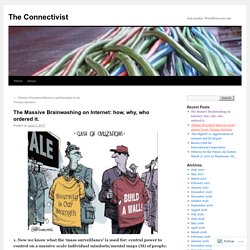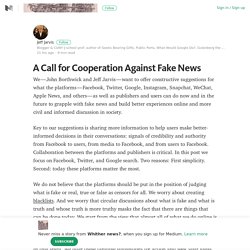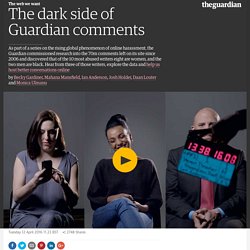

Web Literacy for Student Fact Checkers. Crap Detection Resources. The secret rules of the internet. The Massive Brainwashing on Internet: how, why, who ordered it. 1.

Now we know what the ‘mass surveillance’ is used for: central power to control on a massive scale individual mindsets/mental maps (M) of people. In other words ‘Massive Micro Targeting’. 2. I’ve left Twitter. It is unusable for anyone but trolls, robots and dictators. I deactivated my Twitter account today.

It was more of a spontaneous impulse than a New Year resolution, although it does feel like a juice cleanse, a moulting, a polar-bear plunge, a clean slate (except the opposite – like throwing your slate into a volcano and running). One moment I was brains-deep in the usual way, half-heartedly arguing with strangers about whether or not it’s “OK” to suggest to Steve Martin that calling Carrie Fisher a “beautiful creature” who “turned out” to be “witty and bright as well” veered just a hair beyond Fisher’s stated boundaries regarding objectification (if you have opinions on this, don’t tweet me – oh, wait, you can’t); and the next moment the US president-elect was using the selfsame platform to taunt North Korea about the size and tumescence of its nuclear program.
And I realised: eh, I’m done. What is fake news? How to spot it and what you can do to stop it. Until recently, there was news and “not news” – as denoted by comments of “that’s not news” below the line on more light-hearted stories or features.

A Call for Cooperation Against Fake News – Whither news? – Medium. We — John Borthwick and Jeff Jarvis — want to offer constructive suggestions for what the platforms — Facebook, Twitter, Google, Instagram, Snapchat, WeChat, Apple News, and others — as well as publishers and users can do now and in the future to grapple with fake news and build better experiences online and more civil and informed discussion in society.

Key to our suggestions is sharing more information to help users make better-informed decisions in their conversations: signals of credibility and authority from Facebook to users, from media to Facebook, and from users to Facebook. Collaboration between the platforms and publishers is critical. In this post we focus on Facebook, Twitter, and Google search.
Education Week. Fake news sites designed to trick you - Video - Media. Trash talk: how Twitter is shaping the new politics. When Hillary Rodham Clinton became the first woman in American history to clinch a major party’s presidential nomination, her rival responded with all his customary grace.

“Obama just endorsed Crooked Hillary. He wants four more years of Obama – but nobody else does!” Donald Trump sneered on Twitter. But for once, it was Clinton’s riposte back in June which went viral. Social Media: a hunting ground for cybercriminals. Image copyright Getty Images Do you ever hesitate to click on a post shared by a friend on Facebook?

How technology disrupted. One Monday morning last September, Britain woke to a depraved news story.

The prime minister, David Cameron, had committed an “obscene act with a dead pig’s head”, according to the Daily Mail. Facebook controversy shows journalists are more complicated than algorithms. Silicon Valley is trying to make the news business as neutral as its code.

The problem is the humans. Facebook learned this the hard way this week after a report that staff it contracted to manage its “trending” articles section had suppressed certain stories, such pieces about Facebook or news of interest to conservative users. CEO Mark Zuckerberg, who has spoken out against Donald Trump in the past, now faces an inquiry from US Senate Republicans over whether his company has misled users over its objectivity. Yet a look around the technology industry suggests Facebook will not be the last firm to face such questions. In the past year, Apple, Twitter, Snapchat and Google have also built up news divisions filled with ex-journalists who are charged with making judgments about what is news.
The dark side of Guardian comments. Comments allow readers to respond to an article instantly, asking questions, pointing out errors, giving new leads.

At their best, comment threads are thoughtful, enlightening, funny: online communities where readers interact with journalists and others in ways that enrich the Guardian’s journalism. But at their worst, they are something else entirely. The Guardian was not the only news site to turn comments on, nor has it been the only one to find that some of what is written “below the line” is crude, bigoted or just vile. On all news sites where comments appear, too often things are said to journalists and other readers that would be unimaginable face to face – the Guardian is no exception. 5 tips to improve your critical thinking - Samantha Agoos. Facebook scammers: expert advice on how to stay safe. No, you can’t win tickets for Radio 1’s Big Weekend festival by liking a Facebook page.

It’s not true that there are free business-class flights being given away by Qantas Air. And no, TV show Total Wipeout isn’t bringing a tour to your local city. But all three are recent examples of convincing scams on Facebook where fraudsters pretending to be trusted brands have mocked up pages in search of likes, comments, shares and more from unwitting users. These scams are a sign of how Facebook is a magnet for cybercriminals who see its nearly 1.6 billion monthly active users as 1.6 billion tempting targets. Facebook scams are the most common online attack method, according to the 2016 edition of technology firm Cisco’s Annual Security Report, with 33,681,000 examples identified by the company’s researchers – just ahead of JavaScript attacks in its malware chart.
Adblocking is a small part of the bigger question, who controls the media? Lena Dunham apologises for Photoshop claim after magazine denies airbrushing. Lena Dunham has back-pedalled on her complaint that a Spanish magazine used “mad Photoshop” on a photo of her on its cover following a response from the publisher that not only did it not airbrush the image, but Dunham’s representative signed off on it. Dunham said the misunderstanding highlighted her “long and complicated history with retouching”. “It’s a weird feeling to see a photo and not know if it’s your own body anymore,” she said. Dunham reposted a photo of the cover of Tentaciones, a monthly supplement of the Madrid-based newspaper El País, to her 2.4 million followers on Instagram on Monday.
In the caption, she complained the magazine had airbrushed an image of her taken by Ruven Afanador for Entertainment Weekly in 2012. “This is NOT what my body has ever looked like or will ever look like – the magazine has done more than the average photoshop. The photo received 43,000 likes in fewer than 24 hours. Lena Dunham criticises use of ‘mad Photoshop’ on magazine cover. Lena Dunham has criticised a Spanish magazine that she said used “mad Photoshop” on its cover image of her and appealed for it to be honest with its readers.
The latest issue of Tentaciones (Temptations), a monthly supplement with Spain’s highest-circulation newspaper El País, features an image of Dunham styled in an homage to the British model Twiggy. It was taken by the Colombian-born photographer Ruven Afanador and first appeared in Entertainment Weekly in 2012. Geert Lovink. The Yes Men. 2015. What is Reputation? The big myth Facebook needs everyone to believe. ( J.J. Alcantara/The Washington Post; iStock) In the middle of January, in a change noticed nowhere but Spain, Facebook added six words to a single dialogue box — and inadvertently stumbled into a tortuous national debate. The dialogue box is part of Facebook’s content-reporting process, the means by which users can request that the social network censor their friends. Creating Critical Thinkers Through Media Literacy: Andrea Quijada at TEDxABQED.